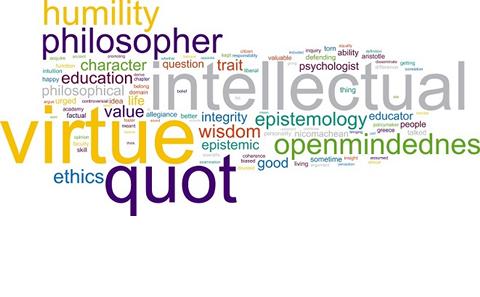Epistemic Vice and Forms of Scepticism Conference Event

- Time:
- 09:45 - 18:00
- Date:
- 13 April 2018
- Venue:
- Avenue Campus, Building 65, Room 1163, University of Southampton, Southampton, SO17 1BF
For more information regarding this event, please email Professor Genia Schönbaumsfeld at gmes@southampton.ac.uk .
Event details
The aim of the one-day conference is to examine the connexion between the intellectual vices and various forms of doubt and scepticism. Although virtue epistemology is currently a booming topic, and the intellectual virtues (and vices) have received considerable attention, the connexion between intellectual vice and scepticism is a totally under-explored topic, both within epistemology itself as well as in wider cultural debates. This seems a particularly glaring omission in light of the fact that a form of ‘knowledge scepticism’ appears to dominate much of contemporary life as witnessed recently in the Brexit and climate-change debates, or the rise to prominence of such dubious notions as ‘post-truth’ and ‘fake news’.
Programme
9:45 - Welcome
10:00 - Quassim Cassam (Warwick): ‘Epistemic Insouciance’
Epistemic insouciance is a casual lack of concern about the facts or an indifference to whether one's statements have any basis in reality. Epistemic insouciance means not really caring much about any of this and being excessively casual and nonchalant about the challenge of finding answers to complex questions, partly as a result of a tendency to view such questions less complex than they really are. It means viewing the need to find evidence in support of one’s views as a mere inconvenience, as something that is not to be taken too seriously. Epistemic insouciance is first and foremost an epistemic posture. It is also an epistemic vice. A related but distinct vice is epistemic malevolence, which is a stance rather than a posture. In this talk I will use recent political events to illustrate and elucidate the notion of an epistemic posture and make it plausible that epistemic insouciance is one such posture. Next, I will elucidate the notion of an epistemic stance, with a view to distinguishing between stances and postures and identifying epistemic malevolence as a stance rather than a posture. Finally, I will explain the sense in which epistemic insouciance and epistemic malevolence are bona fide epistemic vices.
11:15 - Alison Hills (Oxford): ‘Is Creativity an Epistemic Vice?’
Creativity is often considered to be an example of epistemic virtue. I will argue that this is a mistake, and that at least one kind of creativity, "unconstrained creativity" is plausibly a kind of epistemic vice.
12:30 - Lunch
14:00 - J. Adam Carter (Glasgow): ‘Intellectual Vice, Cognitive Enhancement and Scepticism’
According to Ernest Sosa’s virtue epistemology (e.g., 2007, 2009, 2010, 2011, 2015, 2017), one counts as knowing a proposition only if the correctness of one’s belief manifests her intellectual virtue. Intellectual virtues, for Sosa, are (in short) dispositions to believe truly reliably enough. Interestingly, in recent work (i.e., 2017), Sosa has suggested that when beliefs are formed (in part) through the aid of (cognitive) performance enhancements (e.g., 'smart drugs’), such beliefs, when correct, will not be such that their correctness manifests intellectual virtue, and this is claimed to be so even though such 'smart drugs’ are shown to increase—sometimes very significantly—the reliability of cognitive performance across a range of dimensions. If Sosa’s assessment of the epistemic status of cognitively enhanced beliefs is right, then we have reason to suppose both (i) that cognitive enhancement is intellectually vicious; and secondly, (ii) that cognitively enhanced beliefs are categorically not known—and thus, that we should be sceptics about cognitively enhanced beliefs. Of course, one simple way to avoid both these results is to reject Sosa’s virtue epistemology, and accordingly, to deny that knowledge requires the manifestation of intellectual virtue. I believe, however, that such a move is premature. In this paper, I want to show how a development of Sosa’s own distinctive brand of virtue epistemology allows us to (i) distinguish between virtuous and vicious forms of cognitive enhancement; as well as to (ii) maintain that at least some smart-drug-aided beliefs may qualify as knowledge.
15:15 - Aidan McGlynn (Edinburgh): ‘Epistemic Vices and Socially-Situated Ignorance’
In his The Epistemology of Resistance, José Medina offers a detailed account of how members of dominant social groups tend to develop certain epistemic vices, creating and sustaining pools of ignorance that keep them from having to confront the inequalities that they benefit from. Medina’s account offers a framework in which he can offer a novel vice-epistemological account of active ignorance – ignorance that defends, perpetuates, and spreads itself – as well as a novel virtue- and vice-epistemological version of standpoint theory (which I take to be defined by the theses that knowledge and ignorance are socially situated, and that the standpoints associated with certain social locations are epistemically privileged). Despite the book’s influence on recent debates in social epistemology (particularly those concerning epistemic injustice and silencing), there has been surprisingly little critical attention directed at these aspects of Medina’s views. In this talk, I’ll contribute to rectifying this situation, investigating the plausibility of Medina’s discussion of epistemological vices by offering an assessment of how well it captures what we want out of an account of socially-situated ignorance.
16:30 - Coffee/tea break
16:45 - Genia Schönbaumsfeld (Southampton): ‘Intellectual Cowardice and Radical Scepticism’
It is often thought that making concessions to scepticism is what intellectual humility requires. In this talk I challenge this idea by drawing on some thoughts by the Danish philosopher, Søren Kierkegaard, in order to show that some forms of sceptical doubt, rather than intellectually virtuous, are actually manifestations of epistemic cowardice that one ought to resist.
18:00 - Drinks and dinner
This conference is funded by the Mind Association and the Southampton Ethics Centre.
Organisation: Professor Genia Schönbaumsfeld